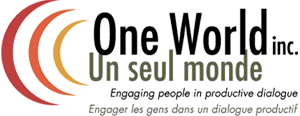Disability: Who’s Responsible for Ensuring a Level Playing Field in the Workplace?
 Perhaps many of us don’t think about how easy it is to push open the correct door to the washroom in a crowded building. The truth is, for those who are not physically, visually or hearing impaired, the world around us makes sense. The recent HRSDC conference on the Rights of Persons with Disabilities shed light on just how challenging the world can be for the millions of people living with a disability and the importance of creating environments to accommodate them. Is it a societal issue and whose responsibility is it to ensure a level playing field?
Perhaps many of us don’t think about how easy it is to push open the correct door to the washroom in a crowded building. The truth is, for those who are not physically, visually or hearing impaired, the world around us makes sense. The recent HRSDC conference on the Rights of Persons with Disabilities shed light on just how challenging the world can be for the millions of people living with a disability and the importance of creating environments to accommodate them. Is it a societal issue and whose responsibility is it to ensure a level playing field?
A Human Rights Issue We Can Not Afford to Ignore
As a human rights issue, we are compelled to take the necessary steps to help level the playing field for people living with disabilities. However, it is also our obligation by UN convention to act. The 2012 HRSDC conference was a launch to bring profile to the signing of the UN convention, but also to impart information about how Canada is moving forward to ensure the rights of disabled persons. The initiative is not limited to the federal level and we are starting to see the same proactive attitude filter down to businesses, NGO’s and prominent charitable organizations as well.
The truth is, the modern organization must be responsive and act on this convention precisely because it is about securing basic human rights for people with disabilities. A societal question for sure, laws are being enacted that compel not only public sector, but private sector as well to be responsive and create the right type of work environments that accommodate people with disabilities.
Working to Avoid Discrimination in the Workplace
If I am a potential new hire competing with someone else for a particular job and I have the education base equal to that person, I cannot be discriminated against because of a disability. Certainly, that applies to vision, hearing or other physical disabilities, but government departments are taking disability law a step further, increasing sensitivity to a wide range of potential concerns. Recent legislation protects workers from odor and scent discrimination, even going as far as designating “scent free” workplace environments.
Proactive government agencies and departments, along with many public, private and not for profit organizations are putting in place computer-based work tools and oral translation devices for hearing or visually impaired employees providing them with resources they need to be productive even with a disability. While many organizations are taking a proactive stance, there is an obligation to put these types of tools in place. As a disabled worker you have the right to be as actively engaged as all employees in your organization and to have in place the tools and technologies that will enable this. .
Moving Towards a Level Playing Field
Today, whether you’re visiting a government building, a private business, even a shopping mall, most elevators, stairwells and washrooms have accommodations for disabled persons. It is a societal obligation to make the world we all share accessible to everyone regardless of limitations.
